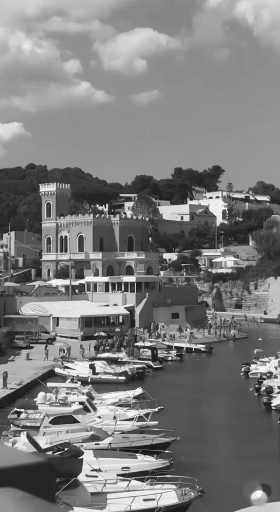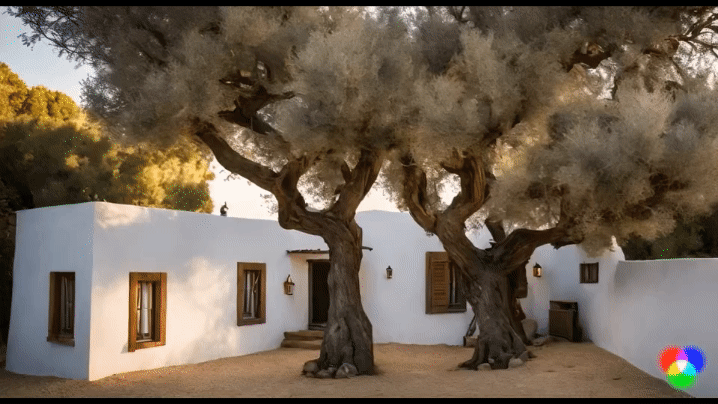Chapter Three
❤️💚A Love Supreme ❤️💚

(This is a scene from 1992.)
Enzo’s family, the Cuores, had the most beautiful Christmas traditions. Their grandmother, his nonna, lived in a humble white stone house just above the piazza in the tiny village of Specchia. Throughout the low light days of December, Enzo, his sister Maria, and their parents would join the grandparents - and just about every villager at the Piazza del Popolo to marvel at the exquisite nativity scenes that adorned the square. The spectacle of warm, white lights and delectable sweets filled the air with magic and joy and delight.
It was a tradition—or a feeling, rather—that would, perhaps unknowingly, spend the rest of his life trying to replicate. Even decades later, long after he had left Italy for good, eventually calling Stanford University and Palo Alto, home.
Specchia was a speck of a place nestled on the heel of the Italian peninsula in the region of Puglia. It may have been overshadowed by cosmopolitan cities like Milan and Rome, but the locals, known as Pugliese, paid no mind to such comparisons. Pugliese cuisine was called cocina povera (poor people’s food). The Pugliese were renowned for their artistry in creating cartapesta, intricately crafted papier mâché figurines that rivaled the beauty of Michelangelo's marble sculptures. Cartapesta was affectionately known as the "poor man's marble."
You get the idea.
Christmas Eve, known as La Viglia (the Vigil) was the holiest night of the year.
Giuseppe, his father, and Maria, his mother, lived in a small home on an olive estate on the outskirts of town. Giuseppe worked as the foreman of agricultural operations, and with the harvest season over, he finally had a break from his work. When December arrived, it allowed him to spend time with his family. Maria worked as a cook in the grand home of the estate's owners. But on Christmas Eve, she didn't have to cook for anyone but her own family. The meal of La Viglia never felt like work to her. The hours spent in her kitchen, making food to feed her family, was love made visible.
In the Mezzogiorno region, the traditional Christmas Eve meal, known as the Feast of the Seven Fishes was a day-long, multi-course celebration. Every year, early in the morning on Christmas Eve, Enzo would accompany his father and his grandfather (both named Giuseppe) and drive thirty miles to Porto Tricase. Once there, the three walked together on the wooden planks between the fishing boats, haggling with fishermen to purchase the best seafood they could afford. But this year carried with it a tinge of sorrow. Enzo's grandfather had received a devastating lung cancer diagnosis a month prior. At the tender age of thirteen, Enzo understood the gravity of the situation. His parents had explained to him that this illness was severe, and his grandfather's time with them would soon be over. Enzo felt broken inside.
With his parents always working, Enzo had spent most afternoons of his youth with his grandfather, his nonno. They would tinker on his beloved 1977 Fiat 127, a car that always seemed to be broken down, or on the verge of collapse. After school, if Enzo finished his homework, Giuseppe would walk his grandson down to the palazzo for gelato, a delight made with fresh fruit harvested just outside town. Enzo had never experienced the death of anyone close to him — let alone the man he idolized. The sadness crept up on him. And it soon weighed heavily on his young shoulders. Throughout Enzo's life, they visited Porto Tricase on scorching summer days, leaping off the seawalls into the green and blue waters of the Ionian Sea. It was winter now, cold and gray. Though his grandfather’s smile and words were as warm and caring as they had ever been, Enzo struggled to find the right words to express the pain he felt, knowing his grandfather’s final days were upon them.
While his father bought scallops from one of the boats, Enzo and his grandfather sat together on a bench. “You know, Enzo, people look at their lives and they say it’s not fair. I look at my life and I say it was a treasure. I have a beautiful wife who loves me unconditionally. I have two darling children who have filled my life with triumphs and challenges. Every day, I thanked God. It wasn't easy and I made many, many mistakes. But now, I look at it and say to myself: All of it was a gift.”
Enzo felt a tight knot of fear and sadness engulf his chest. His eyes burned and he blinked, trying to hold back his tears. Giuseppe put his large hand around Enzo's body, drawing him in close. They gazed out at the somber winter sea together, imagining the storms and the turbulence, that his grandfather’s wisdom would someday help him navigate. Even long after he was gone from this earth.
Giuseppe held him close and continued: “Remember, Enzo, you will have friends. You’re Italian, so of course you will have lovers. You will have calm days and days of unimaginable chaos."
He paused for a moment.
"At the end of your life, you should only hope for a few gifts: A spouse. A family. If you’re fortunate, you may have a best friend or two. Treat these people like they’re the most precious things in your world. And when you reach my age, you will feel a happiness that makes dying less frightening,” his grandfather concluded. “You will have lived a full and meaningful life.”
Tears cascaded down Enzo’s smooth cheeks.
“Nonno, I can’t live without you. I simply can’t,” Enzo said, leaning into his grandfather’s warm chest. He was embarrassed. He believed he shouldn't feel such sorrow when it was Giuseppe who was facing his own mortality.
“Enzo, it is okay to cry. I understand loss. Many people I loved in my life have long since passed away. I promise that you will be okay. You will live a great life. You will discover true love. Let it sweep you away. You will have children of your own.”
He drew a deep, labored breath and kissed Enzo’s head.
“One of the proudest moments of my life was the day I saw my name — Cuore — on your birth certificate. The bond had been passed down and I knew we would endure, right here, in this little village, like the olive grove and fig trees in my yard that will outlive us all. Now, tell me I will live on, not just in your name, but in your heart,” he said, placing his hand on Enzo’s chest.
“I will, nonno. I promise. But please, don’t go,” he said, sobbing uncontrollably.
“If you hold me in your heart, my sweet boy, I will never die,” Giuseppe said, feeling the unending bond between them.

In the evening, as the sun set, the family gathered at their small house in the olive grove. They enjoyed what would be their final festa with their grandfather, although that was left unsaid. The old wooden table, adorned with a slightly frayed red tablecloth, served as the centerpiece of the room. Enzo's mother, grandmother, and sister had baked fresh friselle bread, placing olive oil from this year's harvest on the table to share. On the stove, a rich red tomato puree was mixed with a half-bottle of red wine, and the seven fish varieties, which had simmered for hours. Meanwhile, the orecchiette pasta, the signature ear-shape cut of their region, was handmade and mixed with garlic, olive oil, and chicory they had gathered from all corners of the estate.
That evening was forever implanted in his memory. The six of them laughed and reminisced. They argued about politics, but not for long, and they sang the same Christmas songs and hymns that they sang every year. In the corner of the house there was a delicate handmade nativity scene that Enzo’s great grandmother had made for her family sometime in the 19th century.
After a long dinner, Enzo’s mother made thick espressos for each member of the family. His father put out a round-bottom flask of his homemade pomegranate-flavored grappa on the table. The flask was sealed with cork wrapped in cotton cloth. His grandmother laid out a spread of traditional cookies dripped with honey, along with plates of walnuts, dates and orange slices.
His grandfather leaned back in his chair, gently draping his arm around his wife. Enzo looked at them with everything his young mind had. It was a love that he would spend the rest of his life seeking to emulate. From that evening on, he held an unwavering belief in that love. Perhaps, he would reflect in later years, that love needed longevity to be fully appreciated. Like a portrait on a wall, which reveals itself more and more every time you look at it.
There were days, decades later, when Enzo looked at Ximena and recalled the man who first instilled in him a deep and abiding need to love—and be loved in return.
If only love, the kind his grandparents had so deeply shared, were so easy to come by. As the years wore on, Enzo feared he would spend the prime of his life chasing after a woman incapable of choosing him—a woman incapable, or so it seemed, of loving him back.
